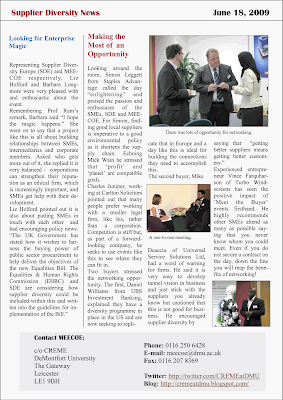
Who cares about ethnic minority enterprise? Public sector bodies will probably fall over themselves to answer this question in the affirmative, shouting loudly about the different policies and measures that they have in place to support ethnic minorities and other diverse groups. The public sector has usually been most prominent in the development of initiatives to support ethnic minority enterprise. This is to be welcomed. But have you ever wondered how major organisations, apart from publicly funded agencies, view ethnic minority entrepreneurs? I am thinking about the finance industry that shapes access to a vital resource for any small firm: money. What about large private sector companies? They often talk about the importance of ‘Corporate Social Responsibility’; but what does it actually mean, and what is its relevance to ethnic minority entrepreneurs? And, in a legal sense, how do we ensure that there is a ‘level playing field’ for ethnic minorities and other diverse groups involved in business? In this pivotal session of the
13th Annual Ethnic Minority Business Conference, we bring together representatives of key organisations to help answer these neglected questions.
Gerard Chick of the
Chartered Institute of Purchasing & Supply (CIPS) kicks off the session with an important presentation on the role that procurers in large organisation can play in promoting diversity in their supply chains. Policy-makers are increasingly recognising that procurement can be used to pursue boarder social objectives, for example, economic regeneration and equality. Gerard, Head of Knowledge Management at CIPS, has been a strong advocate of ‘sustainable procurement’, recognising the fact competitiveness and fairness are inextricably linked.
Most small firms turn to their accountant for advice on all sorts of issues. Research suggests that accountants are a major resource for the development of small businesses, and that their influence extends well beyond the provision of technical advice.
Rosana Mirkovic, Senior Policy Advisor at the
Association of Chartered & Certified Accountants (ACCA), will outline the key role that accountants play in supporting small firms and the plans that the ACCA have to enhance their understanding of ethnic minority entrepreneurs. Recent research by CREME on the ACCA membership has highlighted the key role that ethnic minority accountants play in supporting other ethnic minority businesses.
David Darlaston, Regional Director of
Business in the Community (BiTC) in the West Midlands, has been at the forefront of attempts to engage the corporate sector on a wider range of community-related initiatives. These have included programmes on mentoring, economic regeneration and supplier diversity. At the Conference, David will report on the latest developments to enhance links between the region’s corporate sector and ethnic minority entrepreneurs.
Important legislative changes are afoot that will have potentially significant implications for the issue of diversity in a wide range of organisations. The
Equalities and Human Rights Commission (EHRC) has a key role in implementing the Single Equality Duty which arises from the Equality Bill.
Alan Christie, Director of Policy at the EHRC, will spell out what these developments mean for the public and private sector. As recent research by the EHRC suggests, the renewed attention to diversity signalled by these changes could improve the prospects for ethnic minority entrepreneurs.
The four speakers are members of the ‘Legacy Group’ of the West Midlands ‘
Minority Ethnic Enterprise Centre for Expertise’ (MEECOE). Funded by
Advantage West Midlands, MEECOE is an exciting two-year project that will promote a strategic and innovative approach to supporting ethnic minority businesses in the West Midlands. A consortium led by de Montfort University’s
Centre for Research in Ethnic Minority Entrepreneurship will work with public and private sector stakeholders to enhance policy and practice for ethnic minority enterprise in the region. Legacy Group members are committed to pursuing activies to promoted ethnic minority enterprise.
-Prof Monder Ram-























 After brief introductions, where the sponsors of the event introduced themselves to the participants and provided an overview of their activities, we went through several questions with the attendees covering people’s backgrounds, their businesses and experiences of business support. There were several immediate key findings:-
After brief introductions, where the sponsors of the event introduced themselves to the participants and provided an overview of their activities, we went through several questions with the attendees covering people’s backgrounds, their businesses and experiences of business support. There were several immediate key findings:-